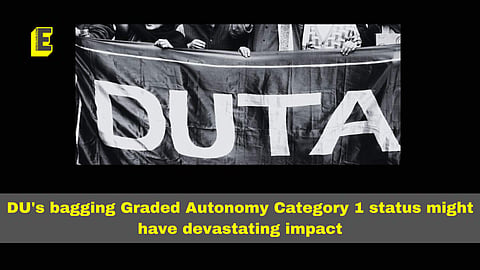
- News
- Campus
- Exam
- Podcast
- Web Stories
- Do You Know
- Path Finders - UG Programs
- Videos
- Book Review

The Democratic United Teachers' Alliance (DUTA) on Friday, August 25, said that the new status granted to Delhi University (DU), that is the Graded Autonomy Category 1 status, might have a devastating impact on the university's autonomy, according to a report by The New Indian Express.
The press conference was addressed by the Joint Candidate of the alliance for the post of DUTA President, Aditya Narayan Misra, who is a former DUTA President and the National Incharge of AADTA (Action and Development Delhi Teachers' Association), former DUTA presidents Rajib Ray and Nandita Narain among others.
What would granting DU the status mean?
The association said that this status vests powers with the Board of Governors (BoGs) to hire and fire teachers at will and wield control over the decisions regarding working conditions, pay, promotion, pension and other benefits. The BoGs can hence, take decisions regarding such points that are an essential part of the working of a university, without reference to UGC (University Grants Commission) Regulations.
Ten organisations and four individuals who have formed an alliance called the Democratic United Teachers' Alliance held a press conference on Saturday, August 26 to shed light on the consequences of the graded autonomy status granted to DU.
The DUTA President further elaborated on the issue and said that the public funding will be replaced by self-financing through loans to be repaid through higher student fees for commercially viable courses and closure of "uneconomic" ones with graded autonomy.
The president said that the delays in payment of salaries, pensions and so on, even in such universities are a signifier of the times to come. He added that this will gradually be followed by massive fee hikes and would further exacerbate the tendencies to exclude which has reportedly already been initiated by the Common University Entrance Test (CUET) process.
"Even if the constitutionally mandated provision of the reservation is retained (though it finds no mention in the National Education Policy (NEP) document), students belonging to deprived sections will be excluded through the back door of high fees," said the president.
He also highlights that several anti-academic moves might be witnessed, where the number of lectures has been reduced from five to three per week and class and tutorial/practical group sizes have been increased to an extent that renders meaningful academic interaction all but impossible.
Apart from this, many courses have been introduced, namely the Value Added Courses and Skill Enhancement Courses, that are redundant as they add neither to values nor skills and leave students too exhausted to focus on the core academic disciplines. Even changes have been introduced with the assessment markings, says the DUTA president.
